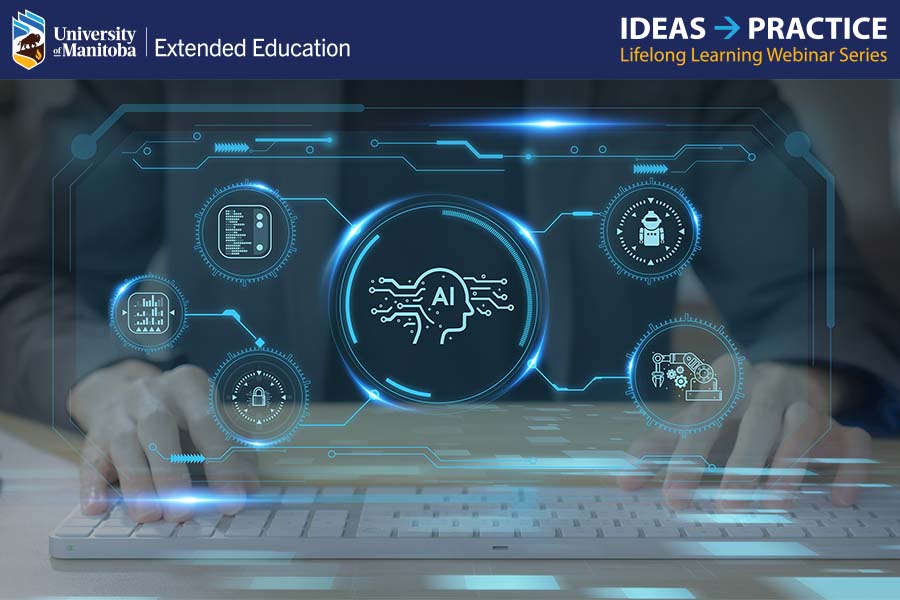
The webinar series continues
AI scales up personalized tutoring, shows promise for the future
Sal Khan shares his story as webinar series continues
It began as a family project and grew into Khan Academy, a personalized learning resource in 50 languages with 150 million users. Founder and CEO, Sal Khan shared his story in UM Extended Education’s latest webinar as the series continues.
In 2004, Sal Khan wanted to tutor his cousin who was having trouble with math. He tutored her remotely and she became one of the best in her class.
“The best way to learn is to practice and get feedback quickly,” says Khan, noting how common it is for students to have gaps in their knowledge and need practice. “I was helping.”
Of course, other family members wanted in, and soon Khan was looking to scale his personalized efforts. “It was a blessing I did not view it as an entrepreneurial journey. I had a day job. This was a passion project.”
Next, he began making videos, just being himself, winging it, thinking through problems on the fly. “I was eccentric, a quirky dude making videos for his family.”
Practice and feedback
Soon, he found that just 30 minutes per week of individual practice and feedback can make a big difference for students. Practice and quick feedback can mean 20 to 90 per cent academic acceleration, according to many studies.
In the summer of 2022, OpenAI called Khan, looking to launch with organizations people trusted like his.
“I was skeptical. It was amazing but was it ready for prime time?”
So, he asked it to answer a biology question. The model chose C. But it did not give the encyclopedia answer he anticipated for its choice. Instead, it explained the answer, and then also why the other answers were incorrect. “I got goosebumps.”
Emulating personalization
Today, Khan continues his journey to emulate the personalization of one-on-one tutoring.
Khan discovered AI could do what a good tutor could do. Of course, there were some errors in training the model. It could hallucinate (give incorrect results), be used for cheating, be biased, provide misleading information.
“There were legitimate risks but there is also legitimate power to empower. As the technology gets better, we have to invest and make this a priority.”
Khan launched Khanmigo (conmigo meaning “with me” in Spanish) in March 2023, as an extension of Khan Academy, building on what he had accomplished. Khanmigo is a generative AI tutor, crafted to navigate students through their educational paths without giving away answers, thus minimizing cheating opportunities. It equips educators with insightful feedback on student progress, aligning closely with desired learning outcomes and fostering a structured, natural learning environment.
He calls it a powerful teacher assistant, to save hours of work and help teachers to connect with students.
It started in two US school districts. Data showed it strongly drove engagement and increased focus. About 15 per cent became superusers. Others were not as into it.
Improvements and fine-tuning continue. “It is anchored on human content, and it is not perfect. It is like a great but sometimes absent-minded tutor.”
Like a tutor, it can consider a problem, and then ask the student to answer it and explain how they did it to assess their reasoning.
“It can walk a student through a project, estimate their grade, report the whole process to their professor.”
Supportive teaching assistant
Yet he does not see it as a replacement for teachers. “This is a supportive teaching assistant, helping teachers with their work and to connect with students.”
In the next few years, he anticipates students will likely be able to converse with their “tutor” and it will be hard to tell it is not a person. And perhaps scholars will publish prompts instead of papers, for a dialogue with the research. Shorter, more understandable information is better and easier to dispel if bunk than long, convoluted essays.
AI can inspire, he says.
Motivate and engage
“Today, almost anyone can access the world’s best knowledge but they are not always motivated. AI has the potential to motivate and engage students.”
He looks forward to the marvels of the future.
“Recently, my daughter created a story with an AI prompt. She wanted to talk to the protagonist, so AI took on the persona. My daughter advised the character, a fictional AI simulation. It was mind blowing. This is the future. It is just the surface of what is possible.”
Rod Lastra, lifelong learning professional at UM Extended Education, appreciates Khan’s insights. Lastra noted how the ideas of machine support traditional education pre-dates the internet days. “In higher education, we need to think about how to integrate the benefits of generative AI into our work,” says Lastra.
And on that note, he looks forward to our next three webinars in the series.
The series continues
Up next, join UM Extended Education on March 1 for The AI Horizon of Higher Education: Emergent Tools and Policy Considerations with Mike Sharples, Professor Emeritus of Educational Technology at The Open University, UK. The conversation will focus on AI policy and regulations arising in the UK and EU and their relevance in Canada.






